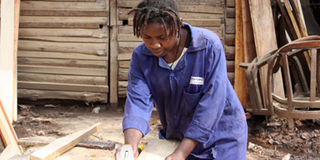Skills helped Tuhaise rise above teenage pregnancy

Deborah Tuhaise goes about her work at her workshop in Kisenyi, Fort Portal Town recently. The 26-year-old says she is trying to upgrade her studies. Photo by Felix Basiime
What you need to know:
- The blow of teenage pregnancy always hits the victim hard and often derails them from their dreams.
- Deborah Tuhaise Akiiki’s childhood dream was to become a journalist but she ended up in a carpentry workshop in Fort Portal Town where she is making ends meet and is an inspiration to other youth in town.
Deborah Tuhaise Akiiki,26, had her dream of becoming a journalist cut short when she became pregnant. Like most girls who get pregnant during school, she thought her education and her worth had come to an end until she found a lifeline in carpentry.
She studied at Buhinga and at Tooro boarding primary schools in Fort Portal Town before she joined Kyebambe Girls and Kabarole Adventist Secondary School for O-Level. She later joined Light College Bulenga for A-Level but dropped out in Senior Five after she got pregnant in 2012.
“I loved journalism. In my Senior Four vacation, I tried to find work on some FM radio stations but failed,” Tuhaise says.
Asked how she developed the love for journalism, she says, “I was an information prefect in school where I learnt to make good relations with the people I meet.” “I performed well in Literature in English and always wanted to do that social work. When I was in Senior Five I also met some journalist called Ken. I do not remember his surname name but he came to our school and inspired us with his talk; he really moved me.”
Switching posts
Despite failing to make it to journalism school, Tuhaise says she now communicates through woodwork.
“I think I can make wood speak the message I need to put out to the public,” she says.
The 26-year-old says she was inspired by her father Robert Alinde who runs a carpentry workshop in Fort Portal Town. When she joined him, she started making cuts and some drawings to improve on the design of the furniture.
“When I started working in my father’s workshop, I quickly learnt a few things such as how to use a wood router. Since I was creative, I could make nice items though small,” she says. But her father motivated her to make big items and learn more. Tuhaise can now operate most of the machines in the workshop and earns between Shs15,000 to Shs20,000 per day.
Getting started
Tuhaise says in 2012, after dropping out of school, she started working in her father’s workshop where she learned on the job and gained a lot of experience. She would use off cuts to make carvings and first bought paint at Shs5,000 to paint her work. Depending on the carvings and size, Tuhaise says she would sell each between Shs10,000 and Shs50,000. Three years later, she started her own workshop.
“I had most of the items needed to start my own workshop. I only needed Shs100,000 for rent,” she says. She started buying some small machines one by one and is still buying more.
“On average, I earn Shs300, 000 in profit per month from my workshop,” she says, adding, “I now love everything about wood. The smell, the shades, the look of its grains and the machines and tools are so fascinating.”
Achievements
As a single mother, she has managed to look after her two children and herself. To cut daily expenses, Tuhaise bought a bicycle to help her run her business. She uses the bicycle to commute from home and for shopping.
“To cut costs on transport, I bought a sport bike. I do not need to pay boda bodas. I ride myself wherever I want to go with my bicycle to buy light materials for my workshop,” she says.
Tuhaise is an inspiration to other youth in town. She has also managed to train more youths who have dropped out of school and right now she has four undergoing training. “I have also gained fame from people who are impressed by my work and encourage me,” she says.
Challenges
Tuhaise says theft is the biggest challenge hindering her business. She says sometimes people steal the portable machines in broad daylight while others break at night. “Recently thieves stole my tool box,” she says.
Like most women, Tuhaise faces stigma from some men who think she cannot manage carpentry. “They say I am not fit for this job, but I do not care because my products speak for themselves,” she asserts.
Future plans
She dreams of a bigger workshop and hopes to start one which will handle all house interior furniture but she says lack of capital is still her big challenge. Currently, she makes cardboards, wardrobes, doors and windows, among others.
“Through my savings I have bought more working tools such as chisels, different plane sizes, among others and power tools such as a grinder and power saws. I also want to buy land,” she says, adding, “Other power tools I want to buy are a CNC router, band saw and a cross cutting saw which can speed up my work and turnover.” And she is still on the journey for formal training.
“I need more skills. I am currently attending a six months training to attain a workers pass with Uganda Small Scale Industries here in Fort Portal. I want to continue with education and study Industrial Art,” she says.
Enrolment
According to the Business Technical Vocational Education and Training (BTVET), plan, the female enrolment is still constituted of only 25 per cent of the total enrolment in the formal BTVET system, concentrated on few occupations. Though the numbers have increased over the years, fields such as business are still dominated by females and male ones such as technical education still dominated by males.




